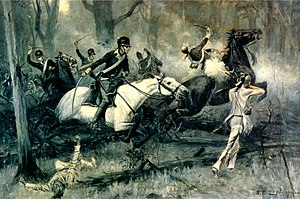| Battle of Fallen Timbers | |||||||
|---|---|---|---|---|---|---|---|
| Part of the Northwest Indian War | |||||||
 Charge of the Dragoons at Fallen Timbers by R. T. Zogbaum, 1895 | |||||||
| |||||||
| Belligerents | |||||||
|
|
Northwestern Confederacy | ||||||
| Commanders and leaders | |||||||
|
|
Blue Jacket Egushawa Little Turtle Buckongahelas | ||||||
| Strength | |||||||
| 3,000 | 1,300 | ||||||
| Casualties and losses | |||||||
|
33 killed 100 wounded | 25–40 killed[A] | ||||||
Location within Ohio | |||||||
The Battle of Fallen Timbers (20 August 1794) was the final battle of the Northwest Indian War, a struggle between Native American tribes affiliated with the Northwestern Confederacy and their British allies, against the nascent United States for control of the Northwest Territory. The battle took place amid trees toppled by a tornado near the Maumee River in northwestern Ohio at the site of the present-day city of Maumee, Ohio.
Major General "Mad Anthony" Wayne's Legion of the United States, supported by General Charles Scott's Kentucky Militia, were victorious against a combined Native American force of Shawnee under Blue Jacket, Ottawas under Egushawa, and many others. The battle was brief, lasting little more than one hour, but it scattered the confederated Native American forces. The U.S. victory ended major hostilities in the region. The following Treaty of Greenville and Jay Treaty forced Native American displacement from most of modern-day Ohio, opening it to White American settlement, along with withdrawal of the British presence from the southern Great Lakes region of the United States.
- ^ Gaff 2004, p. 327.
- ^ Sugden 2000, p. 180.
Cite error: There are <ref group=upper-alpha> tags or {{efn-ua}} templates on this page, but the references will not show without a {{reflist|group=upper-alpha}} template or {{notelist-ua}} template (see the help page).
